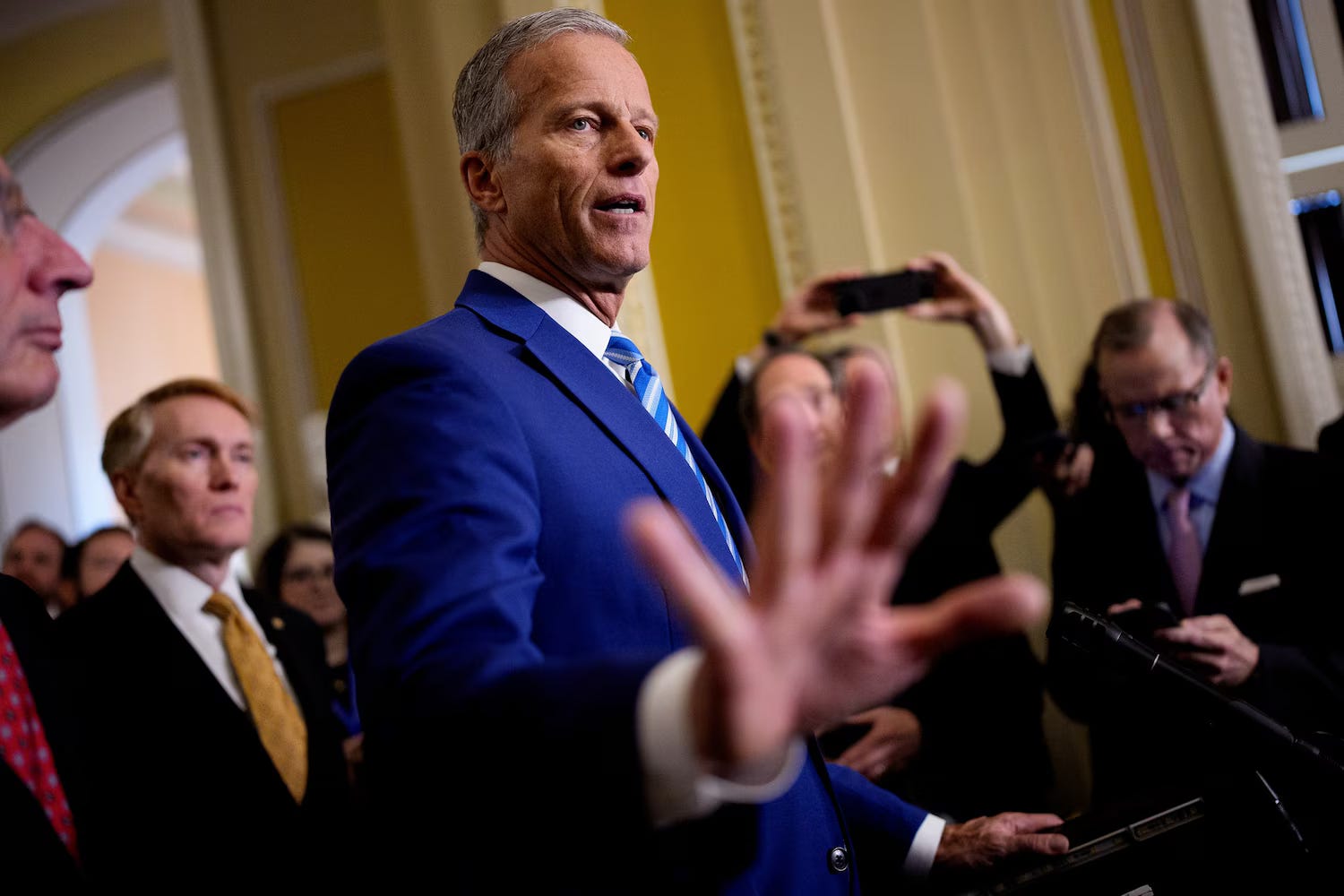Dems throw cold water on Thune’s Plan B
Plus: News and notes on Jeff Merkley’s marathon floor speech, the key takeaways from three new polls and Trump’s bizarre beef post.

👋🏾 Hi, hey, hello! It’s Thursday morning—and Day 23 of the government shutdown, the second-longest in American history. The House has not voted in 33 days. The Senate will adjourn for the weekend this afternoon, and President Donald Trump will travel to Asia on official business. In other words, the funding lapse will reach a month next week unless there is an unexpected breakthrough.
In this morning’s edition, in-depth reporting on why Democrats are opposed to a long-term funding extension that Senate Majority Leader John Thune (R-S.D.) has said will become one of the few mechanisms left to lawmakers if the shutdown persists. But let’s start with lots of news and notes.
— The Senate is expected to vote later today on a bill sponsored by Sen. Ron Johnson (R-Wis.) to provide back pay to furloughed federal employees and military servicemembers. Democrats are expected to oppose it because they say it gives the Trump administration too much discretion in deciding which federal employees to pay. House Minority Leader Hakeem Jeffries (D-N.Y.) opposes the legislation but said he had not spoken to Senate Democrats about it. Sens. Chris Van Hollen (D-Md.) and Gary Peters (D-Mich.) will introduce a Democratic alternative to the Johnson bill, effectively stalling both bills.
Some Democrats say they will reject the bill because the vote excludes an amendment process. A Republican staffer, granted anonymity to speak candidly about the situation, said the only way to formalize that process is to open debate on the bill. Democrats haven’t filed their alternative yet as they work to reconcile the differences in the Van Hollen and Peters bills.
The GOP source suggested Democrats were facing challenges crafting what they described as a counterproposal that would cover the non-essential workers excluded in the Johnson bill because it would be harder to defend voting against the House-passed continuing resolution Democrats blocked from advancing for the 12th time on Wednesday evening since that temporary funding extension would provide back pay to all federal workers. The staffer dismissed the Democrats’ effort as a symbolic gesture to make a political point and not a serious attempt to debate the merits of the different bills.
— The vote on the House-passed CR didn’t occur until after 5 p.m. on Wednesday because Sen. Jeff Merkley (D-Ore.) held the Senate floor for 22 hours and 37 minutes from Tuesday evening to Wednesday evening in a marathon protest of President Donald Trump’s policies and the ongoing government shutdown.
The Oregon Democrat framed his overnight address as a warning about what he described as a growing authoritarian threat in Washington, citing the administration’s use of federal forces in U.S. cities, attacks on the press and economic policies he argued favor the wealthy over working Americans.
Merkley linked his protest to the shutdown, accusing Republicans of refusing to negotiate over expiring health care tax credits and instead using the crisis to advance deep spending cuts. His stand kept Senate staff and security on duty through the night despite the lapse in federal pay, a move that left some Republican lawmakers visibly exasperated.
While not a formal filibuster, the speech was one of the longest in recent Senate history and underscored how lawmakers are increasingly using marathon floor sessions to dramatize political and moral stakes in a gridlocked Congress. Merkley said afterward that his goal was to sound the alarm about what he views as a threat to American democracy and the rule of law.
Sen. Cory Booker (D-N.J.) still holds the record for the longest floor speech in U.S. history (25 hours and 5 minutes), which he broke in April in protest against the Donald Trump administration’s policies and what he characterized as a broader threat to American democratic institutions.
— Three new national polls out this week underscore how weary voters have grown with Washington’s latest standoff—and how that frustration is landing hardest on Republicans and President Trump. Roughly half of respondents across surveys from Quinnipiac, CNBC and Navigator Research say Trump and congressional Republicans are more responsible for the shutdown, compared with about four in ten who fault Democrats.
Independents tilt even more decisively toward blaming the GOP, with margins approaching two to one, despite deep dissatisfaction with Congress overall. Quinnipiac finds approval for Democrats in Congress at 26 percent and for Republicans at 35 percent. Yet when asked which party they’d rather see control the House, voters give Democrats a nine-point edge, thanks largely to support from independents.
Health care remains one of the few bright spots for Democrats. Navigator shows the party leading Republicans by 15 points in terms of trust to handle health care and majorities are rallying behind their position in the shutdown fight when framed around protecting affordable coverage. CNBC’s economic polling adds context to that sentiment: while most Americans say they can access care, nearly a third have put off treatment due to cost and three-quarters still see prices rising. Concerns about affordability continue to outpace any other domestic issue, reinforcing the Democrats’ advantage even as the shutdown dominates the headlines.
Trump’s overall standing hasn’t improved either. His approval rating sits in the low forties across all three polls, with disapproval in the mid-fifties. At roughly the same point in their second terms, Ronald Reagan and Bill Clinton enjoyed approval ratings in the 60s, Barack Obama hovered near 50 percent, and George W. Bush had already fallen into the high 30s—placing Trump near the lower end of that historical range, according to a Once Upon a Hill analysis. (Bush’s steep second-term decline stemmed largely from public disillusionment with the Iraq War—particularly as U.S. casualties mounted and no clear end was in sight—compounded by frustration over the government’s handling of Hurricane Katrina and growing concerns about the economy heading into the 2008 financial crisis.)
Quinnipiac records Trump’s weakest economic marks since 2017—just 38 percent approval—even as his rating on handling the Israel–Hamas conflict jumped after a U.S.-brokered ceasefire and hostage release. Navigator finds similar erosion in confidence regarding the economy and inflation, coupled with broad perceptions of dysfunction in Washington. The upshot is a public mood that’s more exhausted than partisan. Voters are frustrated by the gridlock and skeptical of both parties, but more inclined to blame those currently in charge.
— Jeffries said Wednesday that Democrats plan to sue North Carolina Republicans over a newly passed congressional map that would likely lock in an 11–3 GOP advantage, calling it part of a broader panic among Republicans facing electoral headwinds.
“We’ve never seen this level of extraordinary gerrymandering attempts take place across the country,” Jeffries told reporters after a leadership press conference. “Why do you think it’s happening? It’s happening because the Republican ship is sinking. It’s sinking right now because they failed to deliver anything for the American people.”
The top House Democrat was defiant when asked about the Supreme Court’s upcoming decision on Louisiana’s Voting Rights Act case that could cement GOP gains in several states.
“That’s not gonna happen,” he said. “Democrats are going to take back control of the United States House of Representatives.”
He pointed to strong early turnout in the November 4 elections in Virginia, New Jersey, and California’s Proposition 50 contest.
“Who do you think is turning out? All of this talk throughout the year about us being down in the dumps when we keep winning election after election after election,” Jeffries added. “And Republicans know it. They know it, which is why they’re running scared, running to state after state after state, embarrassing themselves.”
Jeffries also weighed in on reports that Illinois Democrats may redraw their map to offset GOP gerrymanders elsewhere.
“It’s my expectation that Illinois Democrats are going to carefully consider their options and make sure that they draw the fairest map possible,” he said, framing Republican redistricting as “Donald Trump’s efforts to gerrymander congressional maps all across the country.”
Meanwhile, in Indiana, reports suggest state Republicans lack the votes to eliminate one or both of the state’s two remaining Democratic congressional seats—despite intense pressure from the Trump administration as recently as earlier this month when Vice President JD Vance visited the Hoosier State to twist arms on Trump’s behalf.
— President Trump claimed in a bizarre Truth Social post on Wednesday that U.S. cattle ranchers owe their recent success to his tariffs on imported cattle, including a 50 percent levy on Brazil. But he also urged ranchers to lower prices for consumers—an economic contradiction that underscores the tension between Trump’s protectionist trade agenda and his populist message on inflation.
The post landed just as Treasury Secretary Scott Bessent confirmed that the administration is exploring potential beef purchases from Argentina. This move could undercut the very ranchers Trump claims are thriving.
“The Argentinian government is open, and they are running so we are able to negotiate with them,” Bessent said, while noting he hasn’t discussed the matter directly with Trump.
“The Argentinian government is open, and they are running so we are able to negotiate with them. There are many things we wanted to do. We want to get money out to our farmers, especially our soy farmers but the government has been shut down,” he told reporters at the White House. “So I think the Democratic senators—I would say to the moderate Democratic senators, You can be heroes, reopen the government.”
But with Trump simultaneously touting tariffs and courting cheaper foreign beef, his message to ranchers—and to consumers worried about prices—remains as mixed as ever.
Now, back to the four words Democrats hate to hear: full-year continuing resolution.
It’s a Plan B to the House-passed temporary funding extension that Leader Thune and Senate Republicans have started to float as one of the few remain in alternatives to turn and keep the lights on through next fall—weeks before the midterm elections.
Discussions of a full-year CR signal that Senate Republican leadership is bracing for failure in passing regular appropriations bills and is now preparing to punt the entire process into next year. That’s a major admission that would maintain the status quo for the remainder of fiscal year 2026, freezing discretionary accounts across the government and denying Congress its constitutional power to revise or rebalance funding levels through the normal appropriations process.
But Democrats in both chambers this week have bristled at the notion of a full-year CR. In principle, it would undermine their policy goals across the board and also erode Congress’s exclusive constitutional authority to appropriate funds, leaving the executive branch to operate on autopilot under outdated spending constraints.
“These are all quality-of-life issues that have to be dealt with right now,” Jeffries told me. “And yet Republicans want to talk about process and their my-way-or-the-highway approach, their take-it-or-leave-it approach, which is what they’ve been visiting on the American people this entire year, in terms of their extremism, and it’s all unacceptable.”
Jeanne Shaheen, the retiring Democratic senator from New Hampshire and senior member of the Senate Appropriations Committee, indicated earlier this week that she wants no part of the full-year CR discussion.
“I support getting the government open and getting back to the appropriations process.” she added. “I think that’s what we ought to be doing.”
Sen. Brian Schatz (D-Hawaii), another Democratic appropriator, said Democrats still had hope for the appropriations process.
“Obviously, we have to get through the shutdown,” he said. “But there’s bipartisan desire to get something done and to avoid a full-year CR.”
Under regular order, the appropriations process begins each spring when Congress sets overall spending limits, followed by hearings and markups across 12 subcommittees that draft detailed funding bills for every federal department and agency. Those bills are supposed to clear committee, pass both chambers, and be reconciled before the start of the new fiscal year on September 30. The process allows lawmakers to weigh priorities, negotiate trade-offs, and direct funding with precision in the core exercise of Congress’s constitutional power of the purse.
But House Democratic Caucus Chair Pete Aguilar (D-Calif.), who also serves on the House Appropriations Committee, argued on Wednesday afternoon that House Republicans squandered months by pursuing partisan appropriations bills crafted to meet spending levels favored by Donald Trump that they knew the Senate and Democrats would never support. He said Appropriations Chair Tom Cole followed this approach despite knowing it was futile, wasting valuable time that could have been spent negotiating bipartisan funding agreements. Aguilar noted that Democrats have long recognized the September 30 deadline as a fixed endpoint, while Republicans appeared to grasp its urgency only recently, after spending the summer recess without progress.
“We want actual funding bills, but we want those done in a bipartisan way. The American people want that. They want us to address this health care crisis,” Aguilar told me. “It seems like House Republicans and Senate Republicans are the only ones who haven’t realized that.”
House Minority Whip Katherine Clark (D-Mass.) said Republicans should stop fixating on how long a continuing resolution might last and instead engage in serious negotiations to reopen the government and address the health care crisis hurting working families. She pointed out that most households are already struggling to afford essentials like housing, groceries, and utilities—and now face insurance premiums that could rise by as much as $2,000 a month during the shutdown. The number-two House Democrat also accused Republicans of ignoring that reality and of hypocrisy for suddenly casting themselves as defenders of federal workers and public programs after spending years trying to cut them.
“It is amazing to me that the new conversation is, ‘Well, what’s the length of the next CR?’” she said. “We are in a shutdown that is completely avoidable by coming to the table and talking about the American people, and what the Republicans and the president promised: On Day One, we’re going to help lower your costs, and everything has been made harder and more expensive.”
But Thune contends Democrats have tied his hands.
“The clock’s ticking. They’re getting up against the deadline, which makes it increasingly clear to me that they’re not interested in a solution,” Thune said outside his office on Tuesday. “They’re interested in having a political issue that they can use in the campaigns. If they really wanted to fix [ACA premium tax credits], they would open up the government and let us go to work on trying to get a solution in place before the deadline hits.”
Debates on the length of stopgap measures are common around this time of the year. Appropriators generally want a shorter stopgap so Congress can pass full-year funding bills empowered by their authority to allocate spending by program or priority.
But some House conservatives are pushing for the opposite approach by rejecting any stopgap that expires in December to avoid pressure for a year-end omnibus spending deal. They’re instead urging a CR that extends well into the new year—potentially through late January, March, or even beyond. GOP leaders are weighing several options, though Speaker Mike Johnson (R-La.) declined Wednesday to commit to either a longer-term or full-year measure.
“It is going to be more and more difficult with each passing hour to get all the appropriations done on time,” he said. “We acknowledge that, but we have to decide this day by day.”
In the meantime, the deadlock over extending the ACA premium subsidies persists and the government remains closed while both sides wait for the other to compromise. For Jeffries, that would require Johnson to call the House back into session after canceling votes the past four weeks.
“Let’s negotiate a bipartisan agreement. Let’s reopen the government. Let’s address the high cost of living in the United States of America. Let’s address the hunger that you’re creating,” Jeffries said. “And of course, let’s address the Republican health care crisis.”



